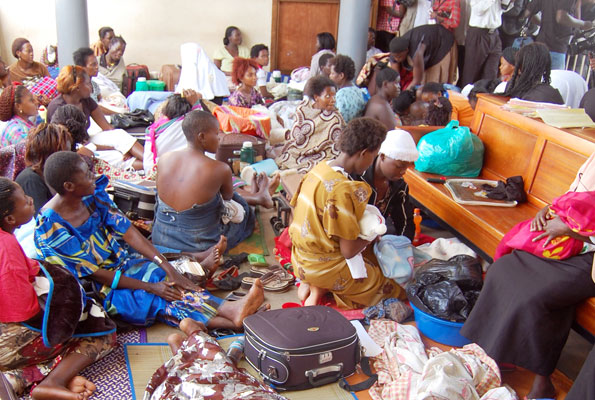Administrators of Bwera Hospital in Kasese District have called upon the government’s intervention because they are grappling with a lack of space in wards, which has limited their ability to admit ill patients, causing a health threat to both the sick and the caretakers.
While being interviewed by journalists at Bwera Hospital on April 11, 2024, Clarence Bwambale, Bwera Hospital Administrator, said that people are sleeping on the floor in the pediatric ward because there is a wing of the neuronal ward that is not functioning, but once it operates again, then the other wards will have relief and people will be accommodated inside.
‘’We are overwhelmed by numbers, hence the reason we are being admitted to the floor. For example, today in the medical ward, we have been able to serve at least a total of 38 patients, yet we have only 26 beds; therefore, the remaining are sleeping on the floor, and that’s what we are grappling with as a hospital,’’ Bwambale narrated.
Bwambale added that the hospital staff are so overwhelmed with the large numbers of people coming from neighboring countries like the DRC who keep flocking into the hospital for medical services on a daily basis, hence worsening the situation. He called upon the government to construct more wards at the hospital.
He also highlighted the dangers of the huge numbers of sick people in the hospital, which will make diseases and infections spread easily.
According to Immaculate Mbambu, a caretaker of an expectant mother, they have been sleeping on the floor for one week because the maternity ward was full to capacity, and she was worried that the situation was a threat to their health, especially for the expectant mother.
In addition, the pediatrician team leader at the hospital, Maurice Basabe, said that malaria, pneumonia, malnutrition, and sickle cell disease are the most common ailments at the health facility.
Basabe added that on an everyday basis, at least two babies or more with sickle cell are brought in for treatment, meaning that on average, per week, the hospital normally has like seven new cases of sickle cell.
‘’We need to engage communities by doing health education workshops on sickle cell disease so that people can be well informed about this disease and know what to do when you have it and when you do not have it,’’ Basabe said.
Both Bwambale and Basabe called upon the government to help them expand the hospital through the construction of more wards because the hospital is full to the brim with a lot of ill patients and the maternal ward can no longer accommodate them, and they also want to prevent the spread of infections and diseases in the hospital.















